If your child has persistent rashes that itch, don’t be too surprised – it may be chickenpox. The good news is that you rarely get chickenpox twice and the disease is usually mild. Dr Chan Poh Chong, head and senior consultant, Division of General Ambulatory Paediatrics and Adolescent Medicine, National University Hospital, shares more about this infectious disease.
What causes chickenpox?
Chickenpox is an infection caused by a virus: varicella zoster. The virus is transmitted through the air and by direct contact with saliva, nasal secretions and fluid from blisters. Children are infectious from 48 hours before the rash starts, until no more new lesions develop and all the lesions have crusted over. They should stay at home during this time, and it is important to avoid contact with pregnant women, as chickenpox infection in late pregnancy can have devastating effects. It is very common during childhood as it is easily transmitted when children are in close proximity, such as in childcare centres or at home among siblings.
What are the symptoms?
Children who come down with the infection first develop an itchy generalised rash. It starts off as pink papules (bumps), and develops into vesicles (fluid-filled blisters) that burst and scab over. New lesions will appear in different areas over several days. Children may also experience fever, appetite loss, mild headache, tummy pain or cough.
Most healthy children have a mild illness, but in severe cases, lesions can spread to the throat and eyes, and other complications such as pneumonia, bacterial skin infection, and nervous system involvement may occur.
Can chickenpox be treated?
There is an anti-viral medication called acyclovir, which doctors can prescribe to lessen and shorten the illness, but it does not totally stop the infection. Most mild cases of chickenpox infection in children usually need only symptomatic treatment such as anti-itch medications, rest and lots of fluids. If there are complications such as secondary bacterial skin infections, antibiotics may be necessary or admission to hospital may be required.
Should I let my child catch chickenpox since the likelihood of catching it a second time is low?
Although chickenpox infection is usually mild in children, it can still cause complications, especially in kids whose immune system may not be able to mount a good response to the virus. Children with sensitive skin or eczema may scratch more during the infection, causing more secondary bacterial skin infections, leading to complications such as cellulitis (severe skin infection) or sepsis (blood infection), which can be dangerous. It is thus advisable not to purposefully expose your child to chickenpox if possible and prevention in the form of chickenpox vaccination is recommended.
Can I prevent my child from getting chickenpox?
Keeping a child clean and healthy are the best ways to reduce infections. Teaching personal hygiene practices such as washing hands and cleaning up after using the toilet are important from a young age. Children should also learn to cover their mouth when coughing or sneezing to prevent the spread of viruses.
To stay strong and healthy, having a proper nutritious diet with adequate vitamins and minerals are the mainstay of a good immune defence system. Adequate sleep and exercise will also boost the immune function in children.
Children who receive the varicella vaccine will be at less risk of getting chicken pox. About 90 per cent of people who receive the chickenpox vaccine will not get chickenpox and, even if they do, it is usually very mild. They will have fewer blisters, are less likely to have a fever, and will recover faster. Children need two doses of the chickenpox vaccine to ensure maximum protection against the disease.
Dr Chan Poh Chong is head and senior consultant, Division of General Ambulatory Paediatrics and Adolescent Medicine, National University Hospital. He has special interest in dermatology, feeding and nutrition as well as vaccinology.
To learn more about other common childhood conditions, click here.



